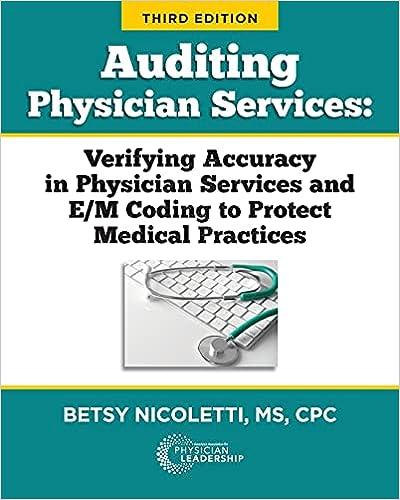Question
26.Under which kind of fraud would an examiner start with the suspected perpetrator? a.Cases of collusion where a co-conspirator agrees to testify against the perpetrator
26.Under which kind of fraud would an examiner start with the suspected perpetrator?
a.Cases of collusion where a co-conspirator agrees to testify against the perpetrator
b.Fraudulent representations (such as tax returns and financial statements)
c.Almost every instance where the suspected perpetrator has a prior fraud conviction
d.If surveillance footage contains smoking gun evidence against the perpetrator
27.You are a fraud examiner who has been hired to investigate a potential embezzlement case. In which order should you go about gathering the evidence?
a.Document analysis, neutral third-party witnesses, co-conspirator(s), corroborative witnesses, target.
b.Target, co-conspirator(s), corroborative witnesses, document analysis, neutral third-party witnesses.
c.Document analysis, neutral third-party witnesses, corroborative witnesses, co-conspirator(s), target.
d.Target, co-conspirator(s), corroborative witnesses, neutral third-party witnesses, document analysis.
28.Many antifraud professionals, forensic accountants, and attorneys will suggest that the outcome of an interview or interrogation may be determined before the first question is asked. What is the underlying belief to this axiom?
a.If you position yourself as an expert, witnesses will generally be reluctant to lie.
b.Professional experience trumps attempts at concealment in most frauds.
c.Eyewitness testimony is reasonably reliable.
d.Preparation is the primary key to success.
29.You are a fraud examiner investigating the theft of a companys automotive parts inventory. After reviewing documents and interviewing witnesses, you have narrowed the list of probable perpetrators to three warehouse workers who appear to have colluded with each other: a forklift operator, a shift leader, and a loader. All three have high school diplomas and earn about 15% more than minimum wage (except for the shift leader, who earns a little more). You decide to interview the forklift driver first (on the belief that the shift leader and the loader are the probable the primary targets). As you talk, you use the terms, collusion, defalcation, and predication. Which of the following statements is most applicable?
a.You should use technical terms and language whenever possible as a power dynamic to persuade witnesses into cooperating with you.
b.You should avoid technical terms and language because they may confuse the interviewee.
c.You should use technical terms and language frequently, especially with people not trained in accounting or forensics because it may prompt them to confess sooner because they tend to assume you know what you are doing.
d.You should avoid technical terms and language because it may cause the interviewee to want to play one-upmanship games with you.
Step by Step Solution
There are 3 Steps involved in it
Step: 1

Get Instant Access to Expert-Tailored Solutions
See step-by-step solutions with expert insights and AI powered tools for academic success
Step: 2

Step: 3

Ace Your Homework with AI
Get the answers you need in no time with our AI-driven, step-by-step assistance
Get Started


